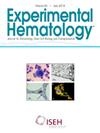胎儿淋巴细胞祖细胞能有效地产生先天样B细胞,但对传统淋巴细胞的产生贡献有限。
IF 2.1
4区 医学
Q2 HEMATOLOGY
引用次数: 0
摘要
具有淋巴细胞潜能的各种祖细胞群在胎儿发育的多个阶段出现,并且可以独立于造血干细胞(hsc)。这篇综述比较和对比了我们对突变小鼠的分析数据,其中胎儿而不是成年淋巴系统完好无损,结果来自谱系追踪研究。这使我们能够解决胎儿淋巴祖细胞在出生后产生淋巴后代的效率和时间。然后,基于这些报告中的数据,我们提出了一个工作模型,表明胎儿淋巴细胞祖细胞有效地产生先天样B-1和边际区B细胞,但它们对适应性免疫系统的B细胞和T细胞产生的贡献更为有限。相反,来自成人造血干细胞的淋巴细胞发育对于用常规淋巴细胞填充次级淋巴组织是必要的,而胎儿祖细胞缺乏这样做的潜力。我们认为,除了产生先天样效应因子外,胎儿淋巴样祖细胞的关键作用是产生足够数量的B细胞和T细胞后代,特别是在肠道中,从而使新生儿和新生儿具有功能性免疫,直到造血干细胞的淋巴形成完全建立。本文章由计算机程序翻译,如有差异,请以英文原文为准。
Fetal lymphocyte progenitors efficiently generate innate-like B cells but make a more limited contribution to the production of conventional lymphocytes
Various progenitor populations with lymphoid potential emerge in multiple waves of fetal development and can do so independent from hematopoietic stem cells (HSCs). This review compares and contrasts data from our analysis of a mutant mouse in which fetal but not adult lymphopoiesis is intact with results from lineage tracing studies. This allowed us to address how efficiently and how long fetal lymphoid progenitors generated lymphoid progeny after birth. We then present, based on the data in these reports, a working model proposing that fetal lymphocyte progenitors efficiently generate innate-like B-1 and marginal zone B cells, but their contribution to the production of B and T cells of the adaptive immune system is more limited. Instead, lymphocyte development from adult HSCs is necessary to fill secondary lymphoid tissues with conventional lymphocytes, and fetal progenitors lack the potential to do so. We propose that, in addition to generating innate-like effectors, the key role of fetal lymphoid progenitors is to produce a sufficient number of B and T cell progeny, particularly in the intestines, so that the newborn and neonate have functional immunity until lymphopoiesis from HSCs is fully established.
求助全文
通过发布文献求助,成功后即可免费获取论文全文。
去求助
来源期刊

Experimental hematology
医学-血液学
CiteScore
5.30
自引率
0.00%
发文量
84
审稿时长
58 days
期刊介绍:
Experimental Hematology publishes new findings, methodologies, reviews and perspectives in all areas of hematology and immune cell formation on a monthly basis that may include Special Issues on particular topics of current interest. The overall goal is to report new insights into how normal blood cells are produced, how their production is normally regulated, mechanisms that contribute to hematological diseases and new approaches to their treatment. Specific topics may include relevant developmental and aging processes, stem cell biology, analyses of intrinsic and extrinsic regulatory mechanisms, in vitro behavior of primary cells, clonal tracking, molecular and omics analyses, metabolism, epigenetics, bioengineering approaches, studies in model organisms, novel clinical observations, transplantation biology and new therapeutic avenues.
 求助内容:
求助内容: 应助结果提醒方式:
应助结果提醒方式:


